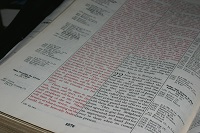Being a graduate student of theology means I’ve been encountering questions that directly challenge the solid faith I’ve come to grow into over the years.
 In my studies I’ve learned that the Church has changed and developed drastically over time, even in just the last century. What we consider to be a long-standing tradition may not have always been. Popes used to be married. Bishops’ roles today are far different than they were in the early Church. The two-natured fullness of Jesus’ humanity and divinity was not settled until 451.
In my studies I’ve learned that the Church has changed and developed drastically over time, even in just the last century. What we consider to be a long-standing tradition may not have always been. Popes used to be married. Bishops’ roles today are far different than they were in the early Church. The two-natured fullness of Jesus’ humanity and divinity was not settled until 451.
Then there are the questions of Christology, which disturb me even more. The Jesus of history is not necessarily the Jesus of faith. Many of his sayings in the Gospels were likely said by him, but others may have been literary additions. Some scholars say that it was unlikely Jesus publicly rebuked the Pharisees. Those stories may have been added by the Gospel authors because the early Christians experienced conflict with the Pharisees. And what about Jesus’ miracles and other acts? Some are plausible and some may have been created by the early Christian community. (Gasp!) Learning all this turned things upside down for me.
What is true is that not everything in the Scriptures is verifiable. But ought one have a crisis of faith? No. The Jesus of our faith and our tradition offers us much in the way of truth. Jesus redefined community and gave new shape to social and personal ways of following God. The parables and other Gospel stories lay out for us timeless messages. Historically verifiable or not, they’re effective means of building faith. St. Ignatius, in the Spiritual Exercises, uses many of these stories to invite us to personal conversion. And I don’t think Ignatius has us shy away from a faith that disturbs. The questions that keep us up at night only further our faith journey.
As Rainer Maria Rilke said, “Be patient toward all that is unsolved in your heart and try to love the questions themselves, like locked rooms and like books that are now written in a very foreign tongue.” The hard questions are not necessarily meant to have answers, but they are meant to rile us up and have us engage with our faith. If we claim to have a faith that’s all put together, well-explained, and perfectly straight, there’s something wrong.

Andy, this is excellent. I’m also a graduate student in theology but I waited until retirement for the opportunity to study. It is such a privilege to continue to learn about one’s faith and to grow in understanding and to expand the box in which we keep God or to let God out of the box. The best thing for me is to continue having aha moments where I find that something I have felt for many years does have a solid basis in theology. The questions are the means for remaining close to our Lord. Thank you.
“The questions that keep us up at night only further our faith journey.”
I find that sentence to ring so true in my faith journey. It can be disturbing at times but never defeating.
Thank you Andy- excellent post.
Faith is belief in the unknown. To have it totally spelled out for you does not require a lot of faith. Get on your knees and spend time or take a walk or go anywhere to your inner room and find God and communicate with Him. He is there, waiting for you.
Develop a relationship with the Creator. That itself will instill in you all of the faith, belief and total trust that you appear to lack. He is not tangible, but real all of the same. Talk to Him. Tell Him you love Him and He WILL respond. God bless.
Good post, Andy. If there are no mysteries, no questions, what good is faith? I enjoy your writing very much. Thank you. Mary Adrienne
My husband and I are finding, as you did, that hermeneutics reveals truths not previously encountered in earlier scripture study. These findings don’t negate the former, rather reveal layer upon layer of truths enriched by Sacred Tradition, the more we learn the more our faith is enriched.
Thank you Andy, this is the kind of deep intellectual thinking I keep trying to find on these blog sites. Your closing sentence, “The hard questions are not necessarily meant to have answers, but they are meant to rile us up and have us engage with our faith. If we claim to have a faith that’s all put together, well-explained, and perfectly straight, there’s something wrong” should be required reading for anyone wishing to start up a Catholic blog.
As for Bible teachings I often (gasp!) wonder at the total accuracy of oral traditions since we all know how a story gets started and then bent out of shape so that by the time ig gets gossiped back to the first teller they no longer recognize it. The first scribes were inspired but not necessarily the first orators.
Thank you Andy.